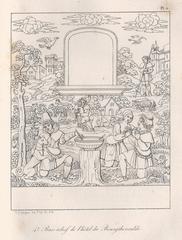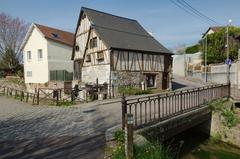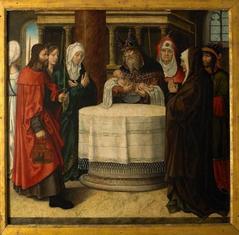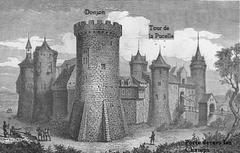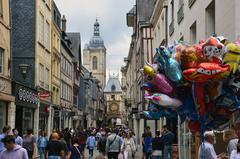Place Martin-Luther-King, Rouen, France: Visiting Hours, Tickets, and Historical Sites Guide
Date: 04/07/2025
Introduction
In the historic heart of Rouen, France, Place Martin-Luther-King stands as a vibrant intersection of history, architecture, and cultural values. Named in honor of Dr. Martin Luther King Jr., this square is a symbol of Rouen’s commitment to justice, equality, and intercultural dialogue. Its centerpiece, the Temple Saint-Éloi, is a remarkable 16th-century structure that has served both Catholic and Protestant congregations, reflecting the city’s layered religious history and enduring spirit of tolerance. Today, the square and its church not only celebrate Rouen’s past but also serve as dynamic community hubs for both locals and visitors.
Table of Contents
- Origins and Historical Development
- Architectural and Cultural Significance
- Visiting Place Martin-Luther-King and Temple Saint-Éloi: Practical Information
- Modern Redevelopment and Community Role
- Heritage Protection and Artistic Legacy
- Navigating Place Martin-Luther-King: Access and Amenities
- Nearby Attractions
- Frequently Asked Questions (FAQ)
- Visitor Tips
- Summary
- References
Origins and Historical Development
Medieval Foundations
The site of Place Martin-Luther-King is deeply rooted in Rouen’s medieval past. The Temple Saint-Éloi traces its origins to the late Middle Ages, originally constructed as a Catholic church dedicated to Saint Éloi (Eligius). Its imposing Gothic architecture, soaring ceilings, and vivid stained glass windows are a testament to the city’s prosperity and the religious fervor of the era (frenchmoments.eu, evendo.com).
French Revolution and Religious Transformation
The French Revolution brought dramatic changes, resulting in the secularization of many religious sites. Saint-Éloi ceased functioning as a Catholic church and was repurposed for secular uses, mirroring national trends of anti-clericalism.
Protestant Reformation and Napoleonic Era
In 1803, by decree of Napoleon Bonaparte, the former church was converted into a Protestant temple for the Reformed Church of France. This marked a pivotal moment, symbolizing the city’s evolving spiritual landscape and its embrace of religious tolerance (Guide Tourisme France). Since then, the Temple Saint-Éloi has served as a central place of worship and community life for Rouen’s Protestant population.
Urban Evolution and Naming
Originally known as the square of Saint-Éloi, the area was eventually renamed Place Martin-Luther-King to honor the famed American civil rights leader. This symbolic gesture reflects Rouen’s enduring advocacy for social justice and intercultural understanding (evendo.com).
Architectural and Cultural Significance
Temple Saint-Éloi: Features and Heritage
The Temple Saint-Éloi is an outstanding example of late Gothic and early Renaissance architecture. Notable features include:
- Intricate stone carvings and pointed arches adorning the façade.
- 16th-century stained glass windows depicting biblical scenes, some of which are preserved in local museums due to their historical value.
- Baroque organ case (classified as a historical monument), central to Rouen’s musical heritage and used for public concerts (Normandie Lovers).
- Historic furnishings and religious artworks, including “La Vierge à l’Enfant” and “Le Bon Samaritain.”
The church’s architecture bears marks of the city’s turbulent religious history, including losses during the Protestant iconoclasm of the 16th century (Guide Tourisme France).
Community and Cultural Life
Today, Temple Saint-Éloi hosts weekly Protestant services, organ concerts, and cultural events, serving as a living center for Rouen’s spiritual and artistic life. The square itself is a welcoming, pedestrian-friendly space with benches, green areas, and nearby cafés, providing an inviting setting for reflection and community gatherings (rouen.epudf.org).
Visiting Place Martin-Luther-King and Temple Saint-Éloi: Practical Information
Opening Hours and Tickets
- Temple Saint-Éloi: Open during Sunday Protestant services (10:30 AM) and special events such as European Heritage Days in September (Petit Futé).
- Square: Public space open 24/7, year-round.
- Admission: Free for both the square and church services. Donations are appreciated for upkeep; some concerts may require tickets—check the official website or event listings for details.
Accessibility
- The square and church are accessible to visitors with limited mobility, though some areas of the church may have steps or uneven surfaces due to historical construction.
- Contact the church or tourist office in advance for specific needs.
Location and Transport
- Address: Place Martin-Luther-King, Rouen, France.
- Public Transport: Accessible by city buses and tramways. Closest stops include Gare Routière and Place des Martyrs de la Résistance (Just Gone Wandering).
- Parking: Paid public parking is available nearby but may be limited during peak hours.
Modern Redevelopment and Community Role
Place Martin-Luther-King has benefited from recent urban revitalization efforts, notably under Rouen’s “Cœur de Métropole” program, aimed at enhancing central public spaces. Improvements include landscaping, pedestrian pathways, and public seating (actu.fr).
The square is a frequent venue for civic events, commemorations, and community gatherings, especially those promoting social justice and dialogue—a fitting use given its dedication to Dr. King.
Heritage Protection and Artistic Legacy
The former Church of Saint-Éloi is officially listed as a historical monument (since 1911), ensuring the preservation of its unique architecture and artistic treasures (monumentum.fr). Key features protected under this designation include:
- Historic stained glass windows
- Period religious artworks and furnishings
- The celebrated baroque organ
These elements attract art and history enthusiasts and make the site a key stop on any Rouen itinerary.
Navigating Place Martin-Luther-King: Access and Amenities
Square Features
- Pedestrian-friendly: Paved walkways, benches, and green spaces.
- Community atmosphere: Surrounded by shops, cafés, and residential buildings.
- Restrooms: Not directly on the square; facilities are available in nearby cafés or public buildings.
Safety and Etiquette
- The square is safe and well-trafficked. It is recommended to remain aware of your surroundings, especially during events.
- Modest dress and respectful behavior are encouraged inside the Temple Saint-Éloi.
Photography
- Allowed in the square. Inside the church, follow posted guidelines or staff instructions, especially during services or concerts.
Nearby Attractions
Within a short walk from Place Martin-Luther-King, you can explore:
- Rouen Cathedral: France’s tallest cathedral, renowned for its Gothic architecture (Normandie Tourisme).
- Gros Horloge: The city’s iconic Renaissance clock tower.
- Place du Vieux-Marché: Historic site of Joan of Arc’s execution.
- Musée des Beaux-Arts: Featuring works by Monet, Caravaggio, and more (The Crazy Tourist).
- Église Saint-Maclou: A prime example of Flamboyant Gothic architecture.
Frequently Asked Questions (FAQ)
Q: What are the visiting hours for Place Martin-Luther-King and Temple Saint-Éloi?
A: The square is open 24/7. The church is open during Sunday services (10:30 AM) and special events.
Q: Are tickets required for entry?
A: General entry is free. Some concerts or special events may require tickets.
Q: Is the site accessible for visitors with limited mobility?
A: Yes, the square is flat and paved. The church is mostly accessible, though some areas may have steps.
Q: Where are the nearest restrooms?
A: In surrounding cafés or public buildings, not directly on the square.
Q: How can I reach the square by public transport?
A: Via city buses and trams; closest stops are Gare Routière and Place des Martyrs de la Résistance.
Visitor Tips
- Best time to visit: Spring and summer for pleasant weather and greenery; early mornings and late afternoons for a quieter experience.
- Footwear: Comfortable shoes recommended for exploring the historic center.
- Events: Organ concerts and cultural events are popular—check local listings, especially during European Heritage Days.
- Guided tours: Available during special events or by arrangement with the church (rouen.epudf.org).
- Safety: Rouen is generally safe, but standard precautions apply during crowded events.
Summary
Place Martin-Luther-King and the Temple Saint-Éloi offer a rich blend of history, architecture, and living culture. From its medieval origins and transformation through the Reformation to its modern role as a community and commemorative space, the site encapsulates Rouen’s commitment to tolerance, dialogue, and remembrance. Its central location and accessibility make it an essential stop for anyone exploring Rouen’s cultural and historical treasures.
For a rewarding visit, combine time at Place Martin-Luther-King with exploration of nearby landmarks such as Rouen Cathedral and the Gros Horloge. Stay updated on local events and practical information by consulting official resources or downloading the Audiala app.
References
- frenchmoments.eu
- Guide Tourisme France
- Petit Futé
- Normandie Lovers
- Normandie Tourisme
- actu.fr
- evendo.com
- monumentum.fr
- Just Gone Wandering
- The Crazy Tourist
